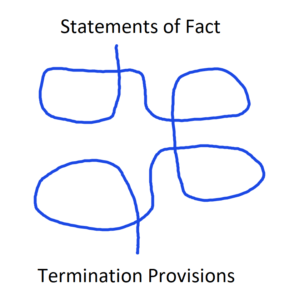 In recent consulting projects I’ve found myself revising client contracts that address issues as both statements of fact and grounds for termination, as in this made-up example:
In recent consulting projects I’ve found myself revising client contracts that address issues as both statements of fact and grounds for termination, as in this made-up example:
Widgetco states that the Widgets are in good working condition.
Acme may terminate this agreement if the Widgets are not in good working condition.
My book The Structure of M&A Contracts (here) discusses how to make statements of fact and obligations in an M&A contract flow efficiently through the rest of the contract. Inspired by that, I’ve found myself experimenting with the following sort of provision as an alternative to saying the same things twice in commercial contracts:
If one or more of the following occurs, Alpha may by notice to Baker terminate this agreement, with termination occurring ten days after Baker receives that notice:
…
a statement of fact made by Baker in this agreement could not be made again on any date after the date of this agreement without being materially inaccurate[, except that if Baker is capable of remedying the circumstances causing a statement of fact to be materially inaccurate, then Alpha shall not terminate this agreement in accordance with this clause X unless Alpha notifies Baker of those circumstances and Baker fails to remedy those circumstances no later than 10 days after Apha so notifies Baker]; …
What do you think?

I like it, but do you think it’s necessary to use this language: “could not be made again on any date after the date of this agreement without being”?
Could it not be replaced by the word ‘becomes’?
“A statement of fact made by Baker in this agreement becomes materially inaccurate…”
Heed this important point: a statement of fact is made at a point in time and speaks only at that point in time. It can’t “become” anything.
Ahhh, I understand. Can’t change the past.
Also, just wondering if by using “on occurrence” you think there would be risk that a breaching party might argue that that wording implies a strict window of time for notifying termination that might override a ‘no waiver’ clause (not a great argument, but sometimes straws are all there are to grasp at). I was thinking that might be avoided by introducing the clause with “if one or more of the following events occurs…” because ‘occurs’ would only signify a condition, whereas ‘on occurrence’ could signify both a condition and a timeline.
Great point! I can’t be counted on to remember my own lessons: see https://www.adamsdrafting.com/the-time-for-taking-action-upon-something-happening/. I’ve adjusted that part. Now it raises the question how long someone can wait, but that’s perhaps a standard sort of question.
I think you should generalize from your insight into termination provisions.
My working hypothesis is that a contract never needs statements of fact, and their objectives are better achieved by other means, though perhaps less concisely.
For example:
*Widgetco states that the Widgets are new and not reconditioned. If any Widget delivered is not new, Widgetco shall replace it with a new one promptly upon Acme’s written notice.*
I submit that the first sentence is needless unless the parties want to omit the second sentence and leave the consequence of falsity to the background law of some jurisdiction.
In acknowledgments, the same:
*The Employer acknowledges that the Employee was once convicted of aggravated attempted intent.*
What’s probably meant is *The Employer shall not deny knowing that the Employee was once convicted of aggravated attempted intent, and shall not take adverse employment action against the Employee on account of that conviction.*
Closing conditions seem to be another instance of the same thought pattern: *If the following things are not true at signing and at Closing, the Buyer is not required to close [and the Seller has to pay the Termination Fee?].*
As I say, it’s only a working hypothesis, but if you brush the foam off the beer, isn’t *every* statement of fact in a contract simply a part of a conditional obligation, exception to obligation, prohibition, grant of discretion, recommendation, or policy? If not, why state the fact?